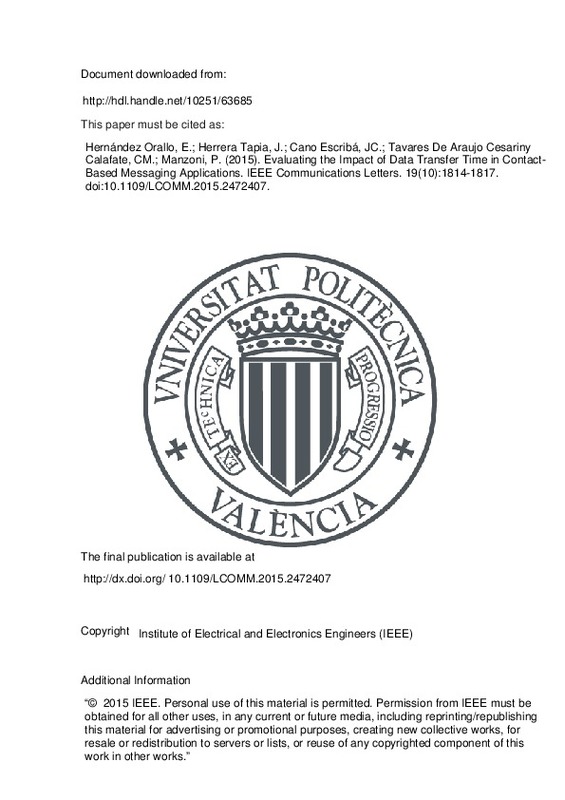JavaScript is disabled for your browser. Some features of this site may not work without it.
Buscar en RiuNet
Listar
Mi cuenta
Estadísticas
Ayuda RiuNet
Admin. UPV
Evaluating the Impact of Data Transfer Time in Contact-Based Messaging Applications
Mostrar el registro sencillo del ítem
Ficheros en el ítem
| dc.contributor.author | Hernández Orallo, Enrique
|
es_ES |
| dc.contributor.author | HERRERA TAPIA, JORGE
|
es_ES |
| dc.contributor.author | Cano Escribá, Juan Carlos
|
es_ES |
| dc.contributor.author | Tavares de Araujo Cesariny Calafate, Carlos Miguel
|
es_ES |
| dc.contributor.author | Manzoni, Pietro
|
es_ES |
| dc.date.accessioned | 2016-05-05T07:55:15Z | |
| dc.date.available | 2016-05-05T07:55:15Z | |
| dc.date.issued | 2015-10 | |
| dc.identifier.issn | 1089-7798 | |
| dc.identifier.uri | http://hdl.handle.net/10251/63685 | |
| dc.description | “© 2015 IEEE. Personal use of this material is permitted. Permission from IEEE must be obtained for all other uses, in any current or future media, including reprinting/republishing this material for advertising or promotional purposes, creating new collective works, for resale or redistribution to servers or lists, or reuse of any copyrighted component of this work in other works.” | es_ES |
| dc.description.abstract | In this letter, we propose an analytical model based on delay differential equations (DDEs) to evaluate the diffusion of messages in groups taking into account the transmission time of themessages. This model was validated through simulation studies using the ONE simulator. Evaluation results show that, considering the impact of data transfer time is of utmost importance, as when message size increases (for example, when transmitting short videos), the diffusion is bounded by this transmission time, and the result is that the diffusion time increases slightly when the number of nodes increases (as opposed to the always decreasing diffusion time of the epidemic diffusion with no delay). | es_ES |
| dc.description.sponsorship | This work was supported in part by Ministerio de Economia y Competitividad, Spain (Grant TEC2014-52690-R). The associate editor coordinating the review of this paper and approving it for publication was I.-R. Chen. | en_EN |
| dc.language | Inglés | es_ES |
| dc.publisher | Institute of Electrical and Electronics Engineers (IEEE) | es_ES |
| dc.relation.ispartof | IEEE Communications Letters | es_ES |
| dc.rights | Reserva de todos los derechos | es_ES |
| dc.subject | Opportunistic networks | es_ES |
| dc.subject | Contact-based messaging | es_ES |
| dc.subject | Performance evaluation | es_ES |
| dc.subject | Epidemic diffusion | es_ES |
| dc.subject.classification | ARQUITECTURA Y TECNOLOGIA DE COMPUTADORES | es_ES |
| dc.title | Evaluating the Impact of Data Transfer Time in Contact-Based Messaging Applications | es_ES |
| dc.type | Artículo | es_ES |
| dc.identifier.doi | 10.1109/LCOMM.2015.2472407 | |
| dc.relation.projectID | info:eu-repo/grantAgreement/MINECO//TEC2014-52690-R/ES/INTEGRACION DEL SMARTPHONE Y EL VEHICULO PARA CONECTAR CONDUCTORES, SENSORES Y ENTORNO A TRAVES DE UNA ARQUITECTURA DE SERVICIOS FUNCIONALES/ | |
| dc.rights.accessRights | Abierto | es_ES |
| dc.contributor.affiliation | Universitat Politècnica de València. Departamento de Informática de Sistemas y Computadores - Departament d'Informàtica de Sistemes i Computadors | es_ES |
| dc.description.bibliographicCitation | Hernández Orallo, E.; Herrera Tapia, J.; Cano Escribá, JC.; Tavares De Araujo Cesariny Calafate, CM.; Manzoni, P. (2015). Evaluating the Impact of Data Transfer Time in Contact-Based Messaging Applications. IEEE Communications Letters. 19(10):1814-1817. https://doi.org/10.1109/LCOMM.2015.2472407 | es_ES |
| dc.description.accrualMethod | S | es_ES |
| dc.relation.publisherversion | http://dx.doi.org/ 10.1109/LCOMM.2015.2472407 | es_ES |
| dc.description.upvformatpinicio | 1814 | es_ES |
| dc.description.upvformatpfin | 1817 | es_ES |
| dc.type.version | info:eu-repo/semantics/publishedVersion | es_ES |
| dc.description.volume | 19 | es_ES |
| dc.description.issue | 10 | es_ES |
| dc.relation.senia | 294542 | es_ES |
| dc.contributor.funder | Ministerio de Economía y Competitividad |







![[Cerrado]](/themes/UPV/images/candado.png)

